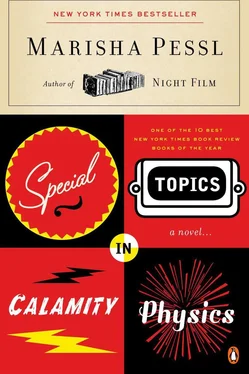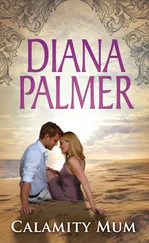Marisha Pessl
Special Topics in Calamity Physics
Dad always said a person must have a magnificent reason for writing out his or her Life Story and expecting anyone to read it.
“Unless your name is something along the lines of Mozart, Matisse, Churchill, Che Guevara or Bond— James Bond — you best spend your free time finger painting or playing shuffleboard, for no one, with the exception of your flabby-armed mother with stiff hair and a mashed-potato way of looking at you, will want to hear the particulars of your pitiable existence, which doubtlessly will end as it began — with a wheeze.”
Given such rigid parameters, I always assumed I wouldn’t have my Magnificent Reason until I was at least seventy, with liver spots, rheumatism, wit as quick as a carving knife, a squat stucco house in Avignon (where I could be found eating 365 different cheeses), a lover twenty years my junior who worked in the fields (I don’t know what kind of fields — any kind that were gold and frothy) and, with any luck, a small triumph of science or philosophy to my name. And yet the decision — no, the grave necessity — to take pen to paper and write about my childhood — most critically, the year it unstitched like a snagged sweater — came much sooner than I ever imagined.
It began with simple sleeplessness. It had been almost a year since I’d found Hannah dead, and I thought I’d managed to erase all traces of that night within myself, much in the way Henry Higgins with his relentless elocution exercises had scrubbed away Eliza’s Cockney accent.
I was wrong.
By the end of January, I again found myself awake in the dead of night, the hall hushed, dark, spiky shadows crouching in the edges of the ceiling. I had nothing and no one to my name but a few fat, smug textbooks like Introduction to Astrophysics and sad, silent James Dean gazing down at me where he was trapped in black and white and taped to the back of our door. I’d stare back at him through the smudged darkness, and see, in microscopic detail, Hannah Schneider.
She hung three feet above the ground by an orange electrical extension cord. Her tongue — bloated, the cherry pink of a kitchen sponge — slumped from her mouth. Her eyes looked like acorns, or dull pennies, or two black buttons off an overcoat kids might stick into the face of a snowman, and they saw nothing. Or else that was the problem, they’d seen everything ; J. B. Tower wrote that the moment before death is “seeing everything that has ever existed all at once” (though I wondered how he knew this, as he was in the prime of life when he wrote Mortality ). And her shoelaces — an entire treatise could be written on those shoelaces — they were crimson, symmetrical, tied in perfect double knots.
Still, being an inveterate optimist (“Van Meers are natural idealists and affirmative freethinkers,” noted Dad) I hoped lurid wakefulness might be a phase I’d quickly grow out of, a fad of some kind, like poodle skirts or having a pet rock, but then, one night early in February as I read The Aeneid , my roommate, Soo-Jin, mentioned without looking up from her Organic Chemistry textbook that some of the freshmen on our hall were planning to crash an off-campus party at some doctor of philosophy’s but I wasn’t invited because I was considered more than a little “bleak” in demeanor: “Especially in the morning when you’re on your way to Intro to ’60s Counterculture and the New Left. You look so like, afflicted. ”
This, of course, was only Soo-Jin talking (Soo-Jin whose face employed the same countenance for both Anger and Elation). I did my best to wave away this remark, as if it were nothing more than an unpleasant odor coming off a beaker or test tube, but then I did start to notice all kinds of unquestionably bleak things. For example, when Bethany brought people into her room for a Friday night Audrey Hepburn marathon, I was distinctly aware, at the end of Breakfast at Tiffany’s , unlike the other girls sitting on pillows chain-smoking with tears in their eyes, I actually found myself hoping Holly didn’t find Cat. No, if I was completely honest with myself, I realized I wanted Cat to stay lost and abandoned, mewing and shivering all by its Cat self in those splintery crates in that awful Tin Pan Alleyway, which from the rate of that Hollywood downpour would be submerged under the Pacific Ocean in less than an hour. (This I disguised, of course, smiling gaily when George Peppard feverishly grasped Audrey feverishly grasping Cat who no longer looked like a cat but a drowned squirrel. I believe I even uttered one of those girly, high-pitched “Ewws,” in perfect harmony with Bethany’s sighs.)
And that wasn’t the end of it. A couple of days later, I was in American Biography, led by our Teaching Assistant, Glenn Oakley, with his cornbread complexion and habit of swallowing right in the middle of a word. He was discussing Gertrude Stein’s deathbed.
“‘So what is the answer, Gertrude?’” Glenn quoted in his pretentious whisper, his left hand up as if holding an invisible parasol, pinky outstretched. (He resembled Alice B. Toklas with that specter-mustache.) “‘Well, Alice, what is the quest- gurgh -tion?’"
I stifled a yawn, happened to glance down at my notebook and saw, in horror, I’d absentmindedly been scribbling in strange loopy cursive a very disturbing word: good-bye. On its own it was breathy and harmless, sure, but I’d happened to scrawl it like some heartbroken lunatic at least forty times down the entire margin of the page — a little bit on the preceding page too.
“Can anyone tell me what Ger- gulp -trude meant by such a statement? Blue? No? Could you stay with us please? What about you, Shilla?”
“It’s ob vious. She was talking about the insufferable vacuity of subsistence.”
“Very good.”
It appeared, in spite of my concerted efforts to the contrary (I wore fuzzy sweaters in yellow and pink, fixed my hair into what I considered a very upbeat ponytail), I had started to twist into that very something I’d been afraid of, ever since all of it had happened. I was becoming Wooden and Warped (mere rest stops on the highway to Hopping Mad), the kind of person who, in middle age, winced at children, or deliberately raced into a dense flock of pigeons minding their own business as they pecked at crumbs. Certainly, I’d always felt chills tiptoeing down my spine when I came across an eerily resonant newspaper headline or advertisement: “Steel Magnate Sudden Death at 50, Cardiac Arrest,” “CAMPING EQUIPMENT LIQUIDATION SALE.” But I always told myself that everyone — at least everyone fascinating — had a few scars. And scars didn’t necessarily mean one couldn’t be, say, more Katharine Hepburn than Captain Queeg when it came to overall outlook and demeanor, a little more Sandra Dee than Scrooge.
My gradual descent into grimdom might have continued unabated, had it not been for a certain startling phone call one cold March afternoon. It was almost a year to the day after Hannah died.
“You,” said Soo-Jin, barely turning from Diagram 2114.74 “Amino Acids and Peptides” to hand me the phone.
“Hello?”
“Hi. It’s me. Your past.”
I couldn’t breathe. It was unmistakable — her low voice of sex and highways, equal parts Marilyn and Charles Kuralt, but it had changed. If once it had been sugared and crackly, now it was porridged, grueled.
“Don’t worry,” Jade said. “I’m not catching up with you.” She laughed, a short Ha laugh, like a foot kicking a rock. “I no longer smoke,” she announced, obviously quite proud of herself, and then she went on to explain that after St. Gallway she hadn’t made it to college. Instead, due to her “troubles” she’d voluntarily admitted herself to a “Narnia kind of place” where people talked about their feelings and learned to watercolor fruit. Jade hinted excitedly that a “really huge rock star” had been in residence on her floor, the comparatively well-adjusted third floor (“not as suicidal as the fourth or as manic as the second”) and they’d become “close,” but to reveal his name would be to forsake everything she’d learned during her ten-month “growth period” at Heathridge Park. (Jade now, I realized, saw herself as some sort of herbaceous vine or creeper.) One of the parameters of her “graduation,” she explained (she used this word, probably because it was preferable to “release”) was that she tie up Loose Ends.
Читать дальше












